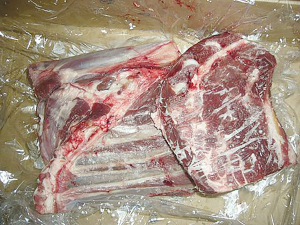New export records for Aussie goatmeat
The Australian goatmeat industry set a new record for production and exports last year.
 Goat meat: There are specific markets for different sized goats with traditional ethnic preferences, especially festival, needs for small goats.
Goat meat: There are specific markets for different sized goats with traditional ethnic preferences, especially festival, needs for small goats.
Why have processor/exporters not encouraged more goat meat when it sells at comparable retail prices to lamb in USA?
This was me first question in my last article. Read 'What about the potential of goat meat exports?' here.
Goats have negatives for the processors. They are not easily handled in the yards to separate lines. Plant operations are affected by different sized animals in a line that slows chain speed and supplied numbers may not match bookings.
With a total NZ goat kill about 120 000 head, spread over several plants, the relatively small numbers do not produce enough by-products to market at profitable prices. So, these end up as pet food, even while there is a premium – such as $US6 per lb for kidney and liver. Goat skins have the same problem – with low interest from buyers in relatively small numbers of variable sizes and qualities.
There are specific markets for different sized goats with traditional ethnic preferences, and especially festival, needs for often small goats. Yet a specific processing issue is small kids are expensive to slaughter with no sale products other than meat.
However, in the US live auction market of 21- 25- 28 kg LW kids there was a 2.5-5% value discount at each step as weight increased. While at 38kg LW or 17 kg CW, kids were discounted by over 15% indicating that market premium for light animals could help to counter higher processing costs.
Traditionally, some processors have successfully used goat slaughter as a plant management strategy to occupy staff and spread overheads during down times with other stock. Fabrication is simple and cheap; with either whole carcases or six-way cuts – no costs for added value, frozen storage and no trade restrictions.
Outside of supplies to a couple of traditional markets, meat is often spot traded – influenced by storage space priority, product competition, supplies, exchange rates and other marketing dynamics. Delivery can be simple by including goat with other frozen meat products.
However, such a processing regime prioritises other stock; so limited goat slaughter times can disadvantage goat farmers. Changing any of this – to access and develop one of more market segments for higher prices – needs farmers to commit to and address processing problems and supply specified numbers of standardised sized stock in identified lines.
These issues can be solved with better co-ordination and cooperation. Higher market returns would encourage more slaughter numbers to slowly overcome by-product and skin limitations and enhance returns.
About the author
Garrick Batten has a long professional and practical career in the goat sector. He has farmed goats for 30 years and written several goat books. His latest book is: ‘Big Buck$ for Pastoral Farmers’. It is especially for livestock farmers new to commercial goat farming. It is available from: https://www.copypress.co.nz/real-nz-books
New Zealand's new Special Agricultural Trade Envoy, Horowhenua dairy farmer, company director and former Minister of Agriculture, Nathan Guy says the Free Trade Agreement (FTA) with India is a good deal for the country.
New figures show dairy farmers are not only holding on to their international workforce, but are also supporting those staff to step into higher-skilled roles on farm.
New tractor deliveries for 2025 jumped 10% compared to the previous year, a reflection of the positive primary sector outlook, according to the Tractor and Machinery Association (TAMA).
Entries have opened for two awards in the New Zealand Dairy Industry Awards (NZDIA) programme, aimed at helping young farmers progress to farm ownership.
Federated Farmers has confirmed interim chief executive Mike Siermans to the role.
Registrations are now open for the 2026 Ruralco Golf Classic, with all proceeds from the event set to support the Mid Canterbury Rural Support Trust.